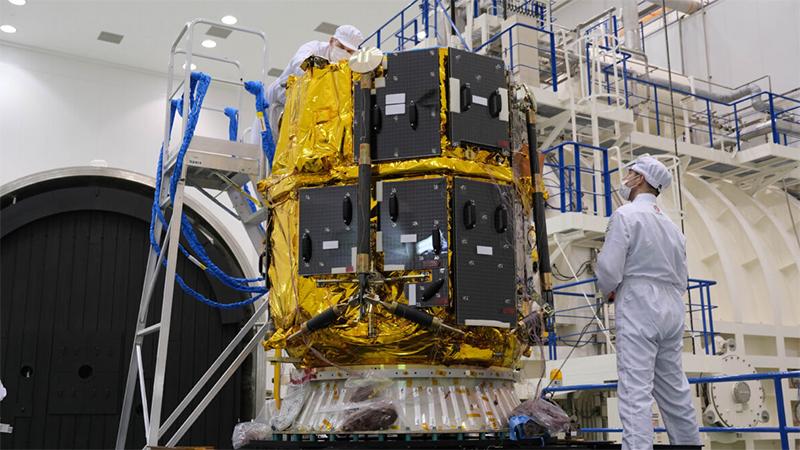This article is published in Aviation Week & Space Technology and is free to read until Apr 19, 2025. If you want to read more articles from this publication, please click the link to subscribe.

ISpace used a JAXA thermal vacuum chamber to test its Resilience lunar lander, which was launched in January and is slated to touch down in June.
Since the launch of its first satellite, Ohsumi, in 1970, Japan’s government has relied on a group of agencies to drive space developments and projects. That is starting to change as the country looks to keep pace in the global space industry.
The government remains a pivotal force in Japan’s space ambitions, but it aims to spur private industry to advance its agenda. To that end, it awarded Astroscale a five-year in-space refueling program contract in January, and it granted ISpace use of a government facility for thermal vacuum testing of its Resilience lunar lander, which launched in January and is due to attempt a touchdown June 6.
- The country is leaning in on a trillion-yen space strategy fund to spark private sector growth
- Shipping giant NYK Line eyes sea-launch opportunities
To keep Japan’s space sector competitive, the government introduced the Space Strategy Fund (SSF) in 2023 to double the domestic space market by 2030 to ¥8 trillion ($6.7 billion) from ¥4 trillion. The Japan Aerospace Exploration Agency (JAXA) is responsible for overseeing the funding, with the goal of developing local industry in space transportation, satellite technology and space exploration.
JAXA President Hiroshi Yamakawa says fostering public-private partnerships requires testing startup and commercial technologies in space. “For private-sector activities to become viable businesses, their technology must be space-proven,” Yamakawa says. “Providing space-testing opportunities is crucial.”
Launch is one area in which Japan is eager to keep pace, especially after it has lost ground to China and as South Korea is pursuing an aggressive agenda to establish a space launch industry. Mitsubishi Heavy Industries started providing commercial launch services in 2007 with its H-IIA rocket. The company now operates the more capable H3 rocket.
New entrants are coming to market, too. Japanese shipping giant NYK Line is exploring ship-based rocket launch services to meet the growing demands of the space industry. The company established its Advanced Technology and Space Development unit in 2023 to pursue the growing launch opportunity. JAXA’s Innovative Future Space Transportation Systems Research and Development Program selected NYK in December to collaborate with Mitsubishi on developing a vessel capable of recovering reusable single-stage rockets at sea.
Tetsuya Haraoka, manager of advanced technology and space development at JAXA, says the team is studying the use of a converted ship or a purpose-built vessel that could facilitate equatorial launch or appeal to countries that want to launch near their own shores.
The launch segment also highlights challenges in the new industry. Japan’s Space One Kairos rocket exploded during its inaugural launch in March 2024, destroying a government intelligence satellite. The second launch in December also ended in failure.
Some industry observers are skeptical about the way in which Japan is pursuing its objectives. Ken Shimizu, managing director for Japan aerospace and defense at Accenture, asserts that the SSF will benefit JAXA’s existing partners primarily and will not be able to compete with the funding levels of China or the U.S. “Japan tends to invest in whatever is popular, but it might be more strategic to anticipate future trends and adapt business strategies accordingly,” Shimizu says.
Rather than spreading its funding over many sectors, he says, the country should focus on building up a strategic niche and become a hub for satellite manufacturing and assembly, leaning on its consumer technology expertise. “Japan is one of the few countries with widely available materials for space manufacturing, a highly skilled assembly workforce and well-equipped facilities,” he says.
Japanese startups are looking beyond the government, as well. JAOPS was founded in 2023 to address market needs in space operations and mission control. CEO Alejandro Sela says the company has found it better to seek direct business dealings than to try to win a share of the SSF.
One of the private sector’s advantages is its willingness to look overseas for talent, Sela notes. Leading Japanese space startups often have a workforce composed of 20-60% international employees. “To strengthen Japan’s position in the global market, it is essential to bring in the best talent from the U.S., Europe and Asia,” he says.





